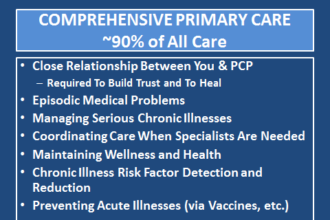A good friend of mine and Whistleblower reader contracted the sniffles and received a prescription for antibiotics at a local urgent care center.
A good friend of mine and Whistleblower reader contracted the sniffles and received a prescription for antibiotics at a local urgent care center. Nothing newsworthy here. So far this quotidian event sounds like a ‘dog bites man’ story. Had antibiotics been denied, this would have been ‘man bites dog’, as this denial would be a radical departure of standard medical practice, particularly in the urgent care universe.
No doubt, my friend was not assigned the dismissive diagnosis of ‘the sniffles’, but was likely given a more ominous diagnosis of ‘acute upper respiratory infection’, a term that sounds so serious that he might have feared that a 911 call had already been made.
Why are antibiotics prescribed so casually and so frequently? Choose from the following answers. There may be more than one correct response.
- Antibiotics are the appropriate ‘shock & awe’ response to sniffle syndromes.
- Patients demand antibiotics and offer evidence of necessity that their prior physician always prescribed them for the exact same symptoms.
- Prescribing antibiotics is a sure method for increasing patient satisfaction.
- Antibiotics are extremely safe and only rarely cause adverse reactions.
- Patients fear that a delay in antibiotics could bring them to the brink of an infectious calamity.
- Drug reps and direct-to-consumer advertising create a climate to prescribe medications including antibiotics.
- It takes a physician 10 seconds to zap an antibiotic prescription to the pharmacy, but could take 10 or 15 minutes to explain why they’re not indicated.
- Antibiotic drug samples in physicians’ offices encourage written prescriptions for patients.
- Since physicians can’t reliably distinguish viral infections from bacterial attacks, it’s safer to prescribe antibiotics just to be sure that a bacterial infection isn’t left untreated.
I’m sure that readers could add many other reasons that contribute to the antibiotic avalanche that is burying us, and I hope you will comment below. Infectious disease specialists and primary care physicians know that the majority of infections seen in outpatient visits are viruses – common colds – which do not respond to antibiotics; yet they are often prescribed for these illnesses. Changing this practice won’t be easy and will take time. Look how long the public resisted buckling up in the car and using bicycle helmets, which are now universally accepted practices.
Antibiotic overutilization has real consequences.
- It costs money.
- It fosters a climate of medical overutilization.
- Antibiotics can cause severe side-effects including C, difficile (C. diff) infections, which can be fatal.
- It leads to the proliferation of resistant bacteria – superbugs – which won’t respond to any available antibiotic. Care to be infected with one of these germs?
The Chief Complaint in medicine refers to the patient’s summary statement explaining the reason for the medical visit. Typical Chief Complaints include:
- Fever and cough
- Chest pain
- Abdominal Pain
- Trouble breathing
These days, many patients have created their own version of the Chief Complaint (CC). Instead of describing their symptoms, they are now directing the treatment. See below.
Medical overutilization is my Chief Complaint.







